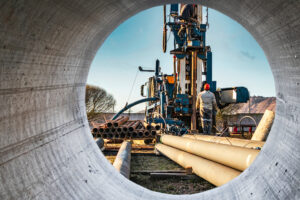Thermoforming is the process of heating sheets of plastic until the material is pliable. The plastic is then moulded and trimmed into a variety of items, like packaging, cups and utensils, and heavier items like fridge linings, shower cubicles and permanent structural components.
Because the range of items produced is so vast, there are different processes: thin-gauge thermoforming for plastic sheets less than 1.5 mm and thick-gauge thermoforming for plastic sheets more than 3 mm thick. The thick-gauge thermoforming process is used to make components for use in heavy industry and drilling, such as composite thread protectors. There is also a medium-gauge thermoforming process for plastic sheets between these two sizes. The thermoforming plastic process is more efficient than injection moulding technology because product development is faster and the tooling costs are lower.
For all of the gauge sizes, the plastic sheeting is fed onto pins that hold it in place while it rolls into an oven. Here, it is exposed to a definite temperature until it is pliable. Next, the sheets are transported to a form station where each one is enclosed, in turn, by a mould and a pressure box.
Vacuuming, a process that forces the plastic to adhere tightly to the mould, removes trapped air from the box. This vacuuming facilitates a transfer of detail from the mould to the plastic. After an interval, the air-eject process ends the vacuum cycle and removes the plastic from the mould. The newly formed sheet then moves to a trim station, where a die cuts the moulded plastic from the nonformed area of the sheet. The unused plastic is usually recycled.
The majority of thermoforming plastic manufacturers make use of computer technology to ensure the efficiency of the process. For example, the plastic pieces that are fed to the pins in preparation for heating and moulding are “indexed” so that they are assigned to the appropriate moulds and cutters.
Microprocessors also monitor oven temperatures, air pressure and other variables to ensure the plastics are heated correctly for efficient moulding. The plastic pieces used in heavy-gauge thermoforming tend to be precut before being either automatically fed or fed by hand into the moulding equipment.
Also, these mouldings are often hand-worked and finished after moulding. This hand working is no minor stage in the manufacturing process, since precision components can require much cutting and finishing in preparation for use in construction and drilling equipment, and as casings for electrical and electronic items.
Overall, it is the standard of the moulding tool and the polymer used in manufacture that determines the quality of the finished items. Precision and quality are vital in the manufacture of composite thread protectors. The plastic part is fitted to a metal component, and this matching of parts requires absolute precision.
Because of its function in absorbing impact and preventing thread corrosion in drills, the thread protector should be made of the highest quality polymer. Every site manager should consider these facts before purchasing thermoforming plastic precision items for use in drilling.
Should you have questions or want more information about thermoforming plastics, contact MSI today!




